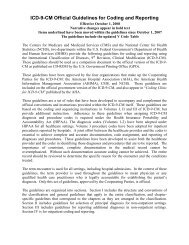STORAGE AND USE OF RESTRICTED INFORMATION ON MOBILE ...
STORAGE AND USE OF RESTRICTED INFORMATION ON MOBILE ...
STORAGE AND USE OF RESTRICTED INFORMATION ON MOBILE ...
You also want an ePaper? Increase the reach of your titles
YUMPU automatically turns print PDFs into web optimized ePapers that Google loves.
Storage and Use of Restricted Information on Mobile Devices and Removable Media Policy HS 9453-C<strong>STORAGE</strong> <strong>AND</strong> <strong>USE</strong> <strong>OF</strong> <strong>RESTRICTED</strong> <strong>INFORMATI<strong>ON</strong></strong> <strong>ON</strong><strong>MOBILE</strong> DEVICES <strong>AND</strong> REMOVABLE MEDIAPURPOSETo establish a policy for the storage and use of Restricted Information on mobiledevices (including but not limited to laptops, cell phones, tablet computers, personaldigital assistants (“PDAs”), USB drives and external hard drives), removable storagemedia or other non-network secured resources in order to safeguard confidentiality andto meet applicable state and federal laws and regulatory standards. This policy appliesto the UCLA Heath System and David Geffen School of Medicine at UCLA (hereafterreferred to as “UCLA Health”).DEFINITI<strong>ON</strong>S“Protected health information” or “PHI” is any individually identifiable healthinformation, in any format, including verbal communications. “Individually identifiable”means that the health or medical information includes or contains any element ofpersonal identifying information sufficient to allow identification of the individual, such asthe patient’s name, address, electronic mail address, telephone number, or socialsecurity number, or other information that, alone or in combination with other publiclyavailable information, reveals the individual’s identity. PHI includes patient billing andhealth insurance information and applies to a patient’s past, current or future physical ormental health or treatment.“Electronic Protected Health Information” or “ePHI” is PHI that is transmitted byelectronic media or is maintained in electronic media. For example, ePHI includes alldata that may be transmitted over the Internet, or stored on a computer, a CD, a disk,magnetic tape or other media.“Personal Information (PI)” as used in this policy is an individual’s first name or firstinitial and last name combined with any one of the following:(1) social security number,(2) driver’s license number or California identification card number,(3) account number, credit, or debit card number, in combination with anyrequired security code, access code, or password that would permitaccess to an individual’s financial account,(4) medical information, or(5) health insurance information.1 of 7 UCLA HealthCompliance Policies and ProceduresPrivacy and Information Security Policies
Storage and Use of Restricted Information on Mobile Devices and Removable Media Policy HS 9453-C“Medical information” means any information, in either electronic or physical form,regarding an individual's medical history, mental or physical condition, or medicaltreatment or diagnosis by a health care professional, and which may be in thepossession of or derived from a health care provider, health care service plan,pharmaceutical company or contractor. “Health insurance information” means anindividual's health insurance policy number or subscriber identification number, anyunique identifier used by a health insurer to identify the individual, or any information inan individual's application and claims history, including any appeals records. Medicalinformation and health insurance information for patients are also considered to be PHI.“Restricted Information” (as defined by UC Policy IS-3, Electronic InformationSecurity) describes any confidential or Personal Information that is protected by law orpolicy and that requires the highest level of access control and security protection,whether in storage or in transit. This includes Personal Information, PHI and ePHI asdefined in this section but could also include other types of information such as researchdata.“Mobile Devices” include but are not limited to laptops, cell phones, smart phones(IPhones, Blackberry, Droid etc.), tablet computers, iPads, PDAs, USB (flash, thumb)drives, and external hard drives.“Removable Media” includes but is not limited to CDs, DVDs, magnetic tape,typewriter ribbons and cartridges.POLICYI. Data and files containing Restricted Information should be secured and stored onUCLA Health mainframe or network drives and servers.II.III.All Restricted Information should be removed from data and files before they arestored on mobile devices or removable media.Restricted Information in the custody or control of UCLA Health workforce mustnot be stored on mobile devices or removable media unless all the conditionsbelow are satisfied:A. There is a compelling patient care, business or academic need.B. The device or removable media is UCLA owned, purchased and/or issued.C. Only the minimum necessary amount of Restricted Information is stored onthe device or removable media.2 of 7 UCLA HealthCompliance Policies and ProceduresPrivacy and Information Security Policies
Storage and Use of Restricted Information on Mobile Devices and Removable Media Policy HS 9453-CD. The Restricted Information is encrypted or other approved security measureshave been implemented to protect the restricted information from loss or theftof the data and/or System.IV.Data containing Restricted Information must never be stored on a non-UCLAownedcomputer, mobile device or removable media unless the user has beengranted an exception to this policy.Workforce members must return all UCLA property including RestrictedInformation, mobile devices and removable media before they terminate fromUCLA Health. UCLA Restricted Information may not be taken with an individualwhen he/she terminates from UCLA Health unless written permission has beenobtained from an appropriate UCLA Health authorizing party.V. Department and program managers are responsible for ensuring that the policyrequirements above are met.VI.The provisions of sections III and IV above are not applicable to RestrictedInformation in email stored on cell phones or smart phones whether UCLAowned or personally owned. Storage of Restricted Information on such devicesmust meet the following provisions.A. There is a compelling patient care, business or academic need and;B. A passcode is set on the device, andC. The passcode is not shared with anyone else, and;D. If the device can support encryption of locally stored email, attachmentsand other data, the user has enabled this feature and;E. The user must alert the Office of Compliance Services if the device is lostor stolen.PROCEDURE / GUIDELINESI. The transmission of Restricted Information to and from the mobile device orremovable media must be performed in a secure manner in accordance withUCLA Health policies and procedures. See: HS Policy 9457, “Minimum SecurityStandards for Network Devices.”II.Restricted Information on UCLA-owned mobile devices or removable media:A. If a user or department has a requirement to collect, store and/or processdata containing Restricted Information on a UCLA-owned mobile device orremovable media, all criteria defined in this policy for such devices mustbe met.3 of 7 UCLA HealthCompliance Policies and ProceduresPrivacy and Information Security Policies
Storage and Use of Restricted Information on Mobile Devices and Removable Media Policy HS 9453-Cf. Will the requestor allow the Office of Compliance Services to audit thepersonally-owned device or removable media?g. What is the plan to return the Restricted Information to a UCLA-ownedserver, mobile device or removable media when the requestor is nolonger engaged in activities for UCLA Health?h. Is the Restricted Information on the personally-owned device originalsource data and if so what is the backed up, disaster recovery,business continuity, etc. plan?i. Other appropriate considerations based on the requestor’s needs andthe nature of the Restricted Information.D. The Office of Compliance Services - Information Security will either:a. Request additional information from the requestor if the informationprovided is not sufficient to make a recommendation:b. Make a recommendation to the business unit representative on theHealth Sciences Enterprise Compliance Oversight Board to eitherapprove or deny the policy exception.IV.All UCLA Health UCLA-owned mobile devices or removable media that containrestricted information must be encrypted.V. AES 128-bit or better encryption must be used for encryption of RestrictedInformation on mobile devices or removable media (see: Office for Civil Rights“Guidance to Render Unsecured Protected Health Information Unusable,Unreadable or Undecipherable”). Complex passwords or passphrases shouldbe used.VI.VII.VIII.Passwords for encrypted devices must be properly secured. Passwords foraccess to encrypted information should not be stored with or near the device.Users must keep track of their mobile devices and removable media to ensurethey are not misplaced and that unauthorized individuals do not have access tothe device or the Restricted Information contained on the device.Workforce members who are authorized to maintain Restricted Informationincluding PHI pertaining to UCLA Health System patients on a mobile devicemust guard against the unauthorized use or viewing of the Restricted Informationon the device.5 of 7 UCLA HealthCompliance Policies and ProceduresPrivacy and Information Security Policies
Storage and Use of Restricted Information on Mobile Devices and Removable Media Policy HS 9453-CIX.Any critical data on mobile devices must be backed up in a secure manner and atan appropriate frequency based on the nature of the data.X. Before replacing or disposing of mobile devices or removable media containingRestricted Information, the user must securely wipe or overwrite the data (see:HS Policy No. 9456, “Physical Security”).XI.XII.XIII.If the user has any reason to believe the data on a mobile device or removablemedia has been compromised, the user must immediately notify his/herDepartment Administrator and the Privacy and Information Security Offices(PrivacyInfoSec@mednet.ucla.edu).QuestionsAny questions on storing Restricted Information on mobile devices or removablemedia should be referred to the user’s IT support group or the Privacy andInformation Security Offices (PrivacyInfoSec@mednet.ucla.edu).EnforcementFailure to follow any provisions of this policy may result in disciplinary action, upto and including termination.REFERENCESHealth Insurance Portability and Accountability Act, 45 CFR 160-164California Medical Information Act, California Civil Code Section 56 et seq.California Civil Code Sections 1798.29 and 1798.82California Health and Safety Code Section 1280.15UCLA Policy No. 404, Protection of Electronically Stored InformationOffice for Civil Rights, Guidance to Render Unsecured Protected Health InformationUnusable, Unreadable or Undecipherablehttp://www.hhs.gov/ocr/privacy/hipaa/administrative/breachnotificationrule/brguidance.htmlhttp://www.hhs.gov/ocr/privacy/hipaa/understanding/coveredentities/federalregisterbreachrfi.pdfNational Institute of Standards and Technology, Guide to Storage EncryptionTechnologies for End User Deviceshttp://csrc.nist.gov/publications/nistpubs/800-111/SP800-111.pdfC<strong>ON</strong>TACTChief Privacy Officer, Office of Compliance Services6 of 7 UCLA HealthCompliance Policies and ProceduresPrivacy and Information Security Policies
Storage and Use of Restricted Information on Mobile Devices and Removable Media Policy HS 9453-CChief Information Security Officer, Office of Compliance ServicesREVISI<strong>ON</strong> HISTORYApproved: April 8, 2003; February 22, 2006Effective Date: April 14, 2003; April 20, 2005,Review Date: July 25, 2012Revised Date: June 30, 2004; April 8, 2005; November 2005; June 21, 2007; May30, 2008, March 31, 2011, October 25, 2012Formerly Policy No. 9452, “Collection and Use of Patient Identifiable Health InformationOn PDAs, Laptops, And Other Portable Computing Devices”APPROVALHealth Sciences Enterprise Compliance Oversight BoardApproved 6/27/12David Feinberg, M.D.CEO and Associate Vice ChancellorUCLA Hospital SystemKevin M. Shannon, M.D .Chief of StaffRonald Reagan UCLA Medical CenterDenise Sur, M.D.Chief of StaffSanta Monica-UCLA Medical Center and Orthopaedic hospitalIan A. Cook, M.D.Chief of StaffResnick Neuropsychiatric Hospital at UCLA7 of 7 UCLA HealthCompliance Policies and ProceduresPrivacy and Information Security Policies
















